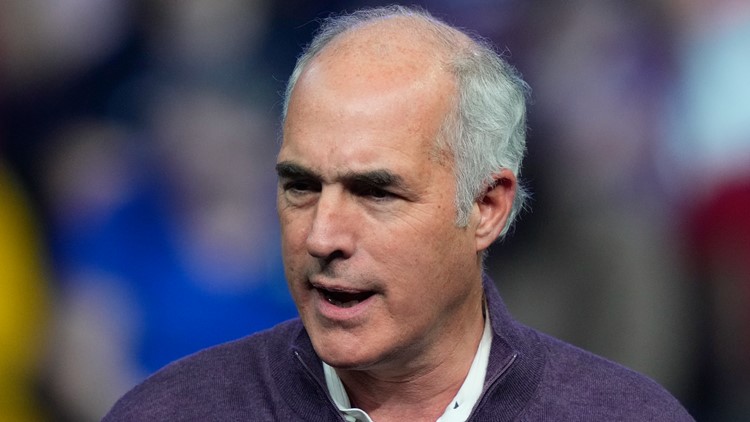WASHINGTON D.C., DC — U.S. Senator Bob Casey sent a letter Friday to President Joe Biden, urging him to create a White House task force to study the unchecked spread of invasive and exploitative workplace surveillance technologies in U.S. workforces.
Casey, a Pennsylvania Democrat, raised concerns about workers being managed by algorithms and automated systems, leaving workers with little recourse or insight when decisions are made about their employment and wages.
“Presently, there is little oversight, accountability or transparency over how emerging workplace technologies and monitoring are impacting workers across the labor market,” Sen. Casey wrote. “Decisions about workplace conditions and workers’ livelihoods are being made solely by employers without consultation or input from workers. Workers deserve a seat at the table when policies and decisions are being made that impact their workplaces and privacy in such a significant way.”
The letter follows an August 2022 letter that Casey sent to Secretary of Labor Marty Walsh asking the Department of Labor to study workplace technologies. Due to the wide range of issues these technologies impact, Casey is now calling for an interagency taskforce, including the Department of Labor, the Federal Trade Commission, the National Labor Relations Board, the Equal Employment Opportunity Commission, the White House Office of Science and Technology Policy, among others.
The full text of Casey's letter appears below.
Dear President Biden:
I write to request that your Administration consider executive action to form a White House Task Force on Workplace Surveillance and Technologies to examine the unchecked spread of invasive and exploitative workplace surveillance and productivity technologies across United States workplaces. Such a task force would be a natural extension of the White House Task Force on Worker Organizing and Empowerment and build off of the recent release of the Blueprint for an AI Bill of Rights from the White House Office of Science and Technology Policy. These issues also align with the Biden-Administration's agenda to lift up the rights and dignity of workers and create forward-looking labor policy to anticipate evolving workplace needs.
Presently, there is little oversight, accountability or transparency over how emerging workplace technologies and monitoring are impacting workers across the labor market. Decisions about workplace conditions and workers’ livelihoods are being made solely by employers without consultation or input from workers. Workers deserve a seat at the table when policies and decisions are being made that impact their workplaces and privacy in such a significant way. Employers are not required to disclose how and what data is being collected on employees. In fact, a growing share of data collection and management is being handled by third-party vendors with little disclosure as to how and where these companies are handling sensitive data and ensuring it is securely stored.
Further, the increased reliance on algorithms and automated systems have left many workers with limited insight into how these systems are being used to make employment and wage decisions, including on workers’ performance and productivity. The constant monitoring even occurs when workers take short breaks, such as to use the bathroom or pump breast milk, which counts as idle time that lowers their productivity scores and puts them at risk of being disciplined. Alarmingly, employers are using these technologies to violate, monitor, or preempt workers’ right to organize.
Some workers are now even managed primarily or entirely by algorithms and automated systems which make employment decisions with little or no meaningful human oversight. There are reports of Amazon workers being inexplicably fired via email by bots. Likewise, many so called “gig economy” workers are primarily managed by algorithms, which determine the pay, ratings, and tasks they are offered. Workers disciplined or terminated by these systems are often left with few options to redress these decisions or engage with a human manager to understand how these decisions were made. Warehouse and e-commerce workers, in particular, are being subjected to novel and high-risk technologies without protections or impact assessments on their potential effects on wages, job quality, and physical and mental health. Novel and high-risk technologies, including but not limited to facial and emotional recognition, biometric monitoring, wearables, productivity management systems, and algorithm-driven employee performance systems, should be studied so that we can better understand how these may cause injury or affect workers’ mental health. While the role of technology to make workplaces safer is important, we need a holistic approach to consider their effects.
Emerging workplace technologies, privacy and surveillance should be treated as a new facet of protecting worker safety and rights. Given the unprecedented nature of these technologies and the historic imbalance in power between workers and their employers, I am especially concerned about the potential impacts on our most vulnerable workers and how this could worsen inequality and discrimination in the labor market and across the economy.
On August 26, I sent a letter to the Department of Labor urging Secretary Marty Walsh to consider rulemaking to address the unique issues and challenges that workers face in the workplace on these issues. I believe that an interagency task force would be well poised to study and provide recommendations for a whole-of-government approach and could include representatives from agencies already examining these issues, including the Federal Trade Commission, the National Labor Relations Board, the Equal Employment Opportunity Commission, the White House Office of Science and Technology Policy, among others.
Thank you for your consideration. I commend you and your Administration for being a champion for working Americans and their rights in the workplace. I look forward to working with your Administration to craft responsible, forward-looking labor policy that ensures all workers everywhere have a reasonable right to privacy and protections in the workplace.



